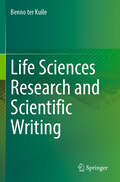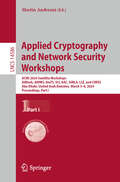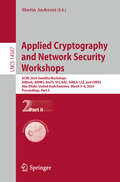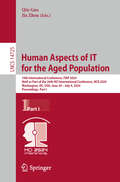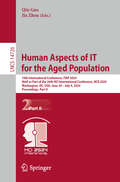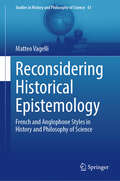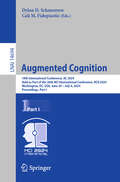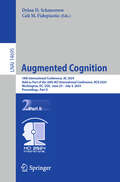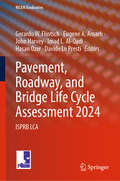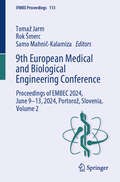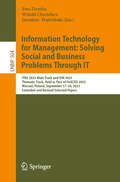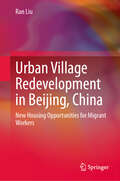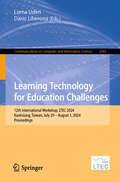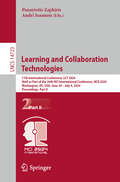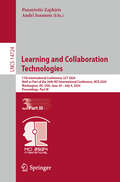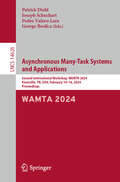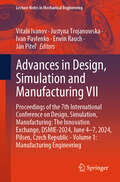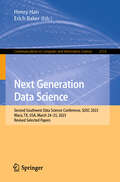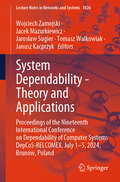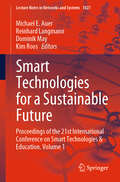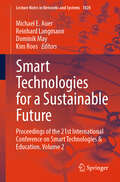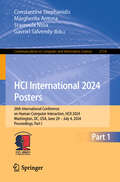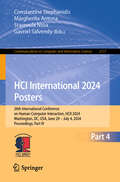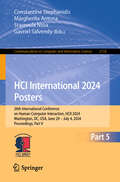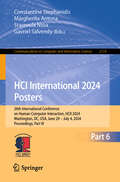- Table View
- List View
Life Sciences Research and Scientific Writing
by Benno ter KuileScientific writing is a trade that can and must be learned and not a form of art that is limited to the talented. The real constraint for writing a good scientific article is most of the time not the usage of the English language, but the conversion of outcomes of a set of experiments into a coherent and convincing scientific story. This book is designed to guide junior scientists in the Life Sciences writing their thesis and first manuscripts, along this uphill struggle. All aspects of building up and publishing a forceful scientific narrative are covered, from designing experiments to dealing with the reviewers’ comments. This book takes you step by step through the process of writing a paper. It starts by discussing how to collect and organize data and make an outline. The actual writing starts with the Results section, as this is the heart of any research paper. The Discussion interprets your data in the framework of the existing literature and explains the novel insights you obtained. The Introduction is written to pose the questions that are answered in the Discussion and give the necessary background information. It is written after the Results and Discussion to make sure it is a perfect match. The M&M is the easiest to write. A good abstract is essential for attracting readers. How to write that is described in detail. The title is the last piece of the puzzle. The book contains many practical examples that explain the general principles of good writing. These examples are all from the Life Sciences and so are the anecdotes that illustrate the concepts, making the information directly applicable. All kinds of tips and suggestions are provided for improving readability and accessibility of your manuscript, thus making it easier acceptable. In addition, background information on the basics of science is supplied that helps to avoid common mistakes that cause rejection of manuscripts that report on otherwise good science.
Applied Cryptography and Network Security Workshops: ACNS 2024 Satellite Workshops, AIBlock, AIHWS, AIoTS, SCI, AAC, SiMLA, LLE, and CIMSS, Abu Dhabi, United Arab Emirates, March 5–8, 2024, Proceedings, Part I (Lecture Notes in Computer Science #14586)
by Martin AndreoniThis two-volume set LNCS 14586-14587 constitutes the proceedings of eight Satellite Workshops held in parallel with the 22nd International Conference on Applied Cryptography and Network Security, ACNS 2024, held in Abhu Dabhi, United Arab Emirates, during March 5-8, 2024. The 33 full papers and 11 poster papers presented in this volume were carefully reviewed and selected from 62 submissions. They stem from the following workshops: 6th ACNS Workshop on Application Intelligence and Blockchain Security (AIBlock 2024). 5th ACNS Workshop on Artificial Intelligence in Hardware Security (AIHWS 2024). 6th ACNS Workshop on Artificial Intelligence and Industrial IoT Security (AIoTS 2024). 5th ACNS Workshop on Secure Cryptographic Implementation (SCI 2024). 1st Workshop on Advances in Asymmetric Cryptanalysis (AAC 2024). 6th ACNS Workshop on Security in Machine Learning and its Applications (SiMLA 2024). 1st Workshop on Low-Latency Encryption (LLE 2024). 4th ACNS Workshop on Critical Infrastructure and Manufacturing System Security (CIMSS 2024).
Applied Cryptography and Network Security Workshops: ACNS 2024 Satellite Workshops, AIBlock, AIHWS, AIoTS, SCI, AAC, SiMLA, LLE, and CIMSS, Abu Dhabi, United Arab Emirates, March 5–8, 2024, Proceedings, Part II (Lecture Notes in Computer Science #14587)
by Martin AndreoniThis two-volume set LNCS 14586-14587 constitutes the proceedings of eight Satellite Workshops held in parallel with the 22nd International Conference on Applied Cryptography and Network Security, ACNS 2024, held in Abhu Dabhi, United Arab Emirates, during March 5-8, 2024. The 33 full papers and 11 poster papers presented in this volume were carefully reviewed and selected from 62 submissions. They stem from the following workshops: 6th ACNS Workshop on Application Intelligence and Blockchain Security (AIBlock 2024). 5th ACNS Workshop on Artificial Intelligence in Hardware Security (AIHWS 2024). 6th ACNS Workshop on Artificial Intelligence and Industrial IoT Security (AIoTS 2024). 5th ACNS Workshop on Secure Cryptographic Implementation (SCI 2024). 1st Workshop on Advances in Asymmetric Cryptanalysis (AAC 2024). 6th ACNS Workshop on Security in Machine Learning and its Applications (SiMLA 2024). 1st Workshop on Low-Latency Encryption (LLE 2024). 4th ACNS Workshop on Critical Infrastructure and Manufacturing System Security (CIMSS 2024).
Human Aspects of IT for the Aged Population: 10th International Conference, ITAP 2024, Held as Part of the 26th HCI International Conference, HCII 2024, Washington, DC, USA, June 29–July 4, 2024, Proceedings, Part I (Lecture Notes in Computer Science #14725)
by Jia Zhou Qin GaoThis two-volume set LNCS 14725-14726 constitutes the thoroughly refereed proceedings of the 10th International Conference on Human Aspects of IT for the Aged Population (ITAP 2024), held as part of the 26th International Conference on Human-Computer Interaction, HCI International 2024 (HCII 2024), was held as a hybrid event in Washington DC, USA, during June/July 2024. The total of 1271 papers and 309 posters included in the HCII 2023 proceedings was carefully reviewed and selected from 5108 submissions. The ITAP 2024 conference offers a broad range of relevant disciplines and domains to exchange 1) research contributions on older people's abilities and competencies, needs and requirements, and attitudes and behavioral patterns in relation to IT use; 2) innovative ideas, practices, and experiences related to the design, operation, and evaluation of IT applications, systems, and services for older people.
Human Aspects of IT for the Aged Population: 10th International Conference, ITAP 2024, Held as Part of the 26th HCI International Conference, HCII 2024, Washington, DC, USA, June 29–July 4, 2024, Proceedings, Part II (Lecture Notes in Computer Science #14726)
by Jia Zhou Qin GaoThis two-volume set LNCS 14725-14726 constitutes the thoroughly refereed proceedings of the 10th International Conference on Human Aspects of IT for the Aged Population (ITAP 2024), held as part of the 26th International Conference on Human-Computer Interaction, HCI International 2024 (HCII 2024), was held as a hybrid event in Washington DC, USA, during June/July 2024. The total of 1271 papers and 309 posters included in the HCII 2023 proceedings was carefully reviewed and selected from 5108 submissions. The ITAP 2024 conference offers a broad range of relevant disciplines and domains to exchange 1) research contributions on older people's abilities and competencies, needs and requirements, and attitudes and behavioral patterns in relation to IT use; 2) innovative ideas, practices, and experiences related to the design, operation, and evaluation of IT applications, systems, and services for older people.
Reconsidering Historical Epistemology: French and Anglophone Styles in History and Philosophy of Science (Studies in History and Philosophy of Science #61)
by Matteo VagelliThis book explores the key conceptual stakes underpinning historical epistemology. The strong Anglophone interest in historical epistemology, since at least the 1990s, is typically attributed to its simultaneously philosophical and historical synthetic approach to the study of science. Yet this account, considered by critics to be an unreflective assumption, has prevented historical epistemology from developing a clear understanding and definition, especially regarding how precisely historical and philosophical reflections on the sciences should be combined. Thus, this book uniquely analyses how the problems and tensions inherent to the “contemporary” phase of historical epistemology can be clarified by reference to the “classical” French phase. The archaeological method of Michel Foucault, which draws on and transforms fundamental insights by Gaston Bachelard and Georges Canguilhem, is used to exert an enduring influence on the field—especially through the work of Ian Hacking and his philosophical cum historical analyses of “styles of scientific reasoning”. Though this book is of great value to academic specialists and graduate students, the fact it addresses questions broad in scope ensures it is also relevant to a range of scholars in many disciplines and will provoke discussion among those interested in foundational issues in history and philosophy of science.
Augmented Cognition: 18th International Conference, AC 2024, Held as Part of the 26th HCI International Conference, HCII 2024, Washington, DC, USA, June 29–July 4, 2024, Proceedings, Part I (Lecture Notes in Computer Science #14694)
by Dylan D. Schmorrow Cali M. FidopiastisThis book constitutes the refereed proceedings of the 18th International Conference on Augmented Cognition, AC 2024, held as part of the 26th HCI International Conference, HCII 2024, which took place in Washington, DC, USA, during June 29–July 4, 2024. The total of 1271 papers and 309 posters included in the HCII 2024 proceedings was carefully reviewed and selected from 5108 submissions. The AC 2024 proceedings were organized in the following topical sections: Part I: Understanding cognitive processes and human performance; advancing cognitive abilities and performance with augmented tools; Part II: Advances in augmented cognition technologies; applications of augmented cognition in various contexts.
Augmented Cognition: 18th International Conference, AC 2024, Held as Part of the 26th HCI International Conference, HCII 2024, Washington, DC, USA, June 29–July 4, 2024, Proceedings, Part II (Lecture Notes in Computer Science #14695)
by Dylan D. Schmorrow Cali M. FidopiastisThis book constitutes the refereed proceedings of the 18th International Conference on Augmented Cognition, AC 2024, held as part of the 26th HCI International Conference, HCII 2024, which took place in Washington, DC, USA, during June 29–July 4, 2024. The total of 1271 papers and 309 posters included in the HCII 2024 proceedings was carefully reviewed and selected from 5108 submissions. The AC 2024 proceedings were organized in the following topical sections: Part I: Understanding cognitive processes and human performance; advancing cognitive abilities and performance with augmented tools; Part II: Advances in augmented cognition technologies; applications of augmented cognition in various contexts.
Pavement, Roadway, and Bridge Life Cycle Assessment 2024: ISPRB LCA (RILEM Bookseries #51)
by John Harvey Imad L. Al-Qadi Hasan Ozer Gerardo W. Flintsch Eugene A. Amarh Davide Lo PrestiThis book highlights the latest advances, innovations, and applications in the field of LCA in pavements, bridges, and roadways, as presented by leading international researchers at the 6th International Symposium on Pavement, Roadway, and Bridge Life Cycle Assessment (ISPRB LCA2024), held in Arlington, VA, USA, on June 6–8, 2024. It covers a diverse range of topics concerning assessment of environmental impacts of pavements, bridges, and roadways, including environmental product declarations (EPDs) and use of life cycle assessment (LCA) in design, data, and case studies: LCA methodologies for transportation infrastructure, durability and service life assessments, maintenance strategies to enhance performance and minimize environmental impacts, evaluating the environmental impacts of materials and construction, recycling and reuse of materials, carbonation of concrete, pavement vehicle interaction, life cycle thinking in climate change planning, and climate change mitigation. The contributions, which were selected by means of a rigorous international peer-review process, present a wealth of exciting ideas that will open novel research directions and foster new multidisciplinary collaborations.
9th European Medical and Biological Engineering Conference: Proceedings of EMBEC 2024, June 9-13, 2024, Portorož, Slovenia, Volume 2 (IFMBE Proceedings #113)
by Samo Mahnič-Kalamiza Tomaž Jarm Rok ŠmercThis book informs on new trends, challenges, and solutions, in the multidisciplinary field of biomedical engineering. It covers traditional topics in biomechanics and biomedical signal processing, as well as recent trends relating to the applications of artificial intelligence and IoT in healthcare, wearable devices for patient monitoring, monitoring of medical devices, machine learning applications in medical data, among others. Gathering the second volume of the proceedings of the 9th European Medical and Biological Engineering Conference (EMBEC 2024), held on June 9-13, 2024, in Portorož, Slovenia, this book bridges fundamental and clinically-oriented research, emphasizing the role of translational research in biomedical engineering. It aims at inspiring and fostering communication and collaboration between engineers, physicists, biologists, physicians and other professionals dealing with cutting-edge themes in and advanced technologies serving the broad field of biology and healthcare.
Information Technology for Management: ITBS 2023 Main Track and ISM 2023 Thematic Track, Held as Part of FedCSIS 2023, Warsaw, Poland, September 17–20, 2023, Extended and Revised Selected Papers (Lecture Notes in Business Information Processing #504)
by Ewa Ziemba Witold Chmielarz Jarosław WątróbskiThe present book includes extended and revised versions of a set of selected papers submitted to the Topical Area of Information Technology for Business and Society, ITBS 2023, and two Thematic Tracks: Information System Management, ISM 2023, and Knowledge Acquisition and Management, KAM 2023, held in Poland, Warsaw, during September 17- 20, 2023. ITBS 2023 received 26 submissions, from which 6 full papers and 2 short papers have been accepted; for ISM 2023 3 full papers and 1 short paper have been accepted from 21 submissions; and for KAM 2023 1 full paper has been accepted from 7 submissions. From the 6 submissions to DSH 2023, no paper passed the extended reviews. The accepted papers are grouped in sections on IT in Improving of Management Systems, Approaches to Improving of Social Problems, and Methods of Solving Business.
Urban Village Redevelopment in Beijing, China: New Housing Opportunities for Migrant Workers
by Ran LiuThe book provides a multi-stage assessment of the changing housing opportunities of migrant workers in the three stages of Beijing’s urban village development (emergence, erasure and preservation). The volume re-theorizes Henry Lefebvre’s notion of the “right to the city” as a largely property-based concept that falls within the city’s hybrid tenure matrix of varying degrees of tenure security and formality that is undergoing entrepreneurialization or gentrification. This is another highly valuable contribution to China studies from the geographical perspective of the “territorial politics” at play in the process of urban village redevelopment, which has fostered a new propertied landowning class as winners, while moving low-wage migrants. The book takes the reader on a fascinating journey from peri-urban villages to IT worker villages to artists’ villages, revealing a restless landscape of urbanism and state-centered governance, as well as bottom-up counterplots. The fieldwork explores the contradictions of urban village redevelopment in Beijing. On the one hand, it is state-dominated and yet creates new housing opportunities for migrants; on the other, it disrupts old orders but also encourages new forms of grassroots alliances. The empirical studies of Beijing’s urban villages enrich Henry Lefebvre’s discourse on “planetary urbanisation,” Gilles Deleuze and Félix Guattari’s notion of the “rhizome,” and Elinor Ostrom’s ideas on the wise management of the “commons.”
Learning Technology for Education Challenges: 12th International Workshop, LTEC 2024, Kaohsiung, Taiwan, July 29 – August 1, 2024, Proceedings (Communications in Computer and Information Science #2082)
by Lorna Uden Dario LiberonaThis book constitutes the refereed proceedings of the 12th International Conference on Learning Technology for Education Challenges, LTEC 2024, held in Kaohsiung, Taiwan, during July 29–August 1, 2024. The 26 full papers included in this book were carefully reviewed and selected from 51 submissions. They were organized in topical sections as follows: serious games and virtual learning environments; learning practices and methodologies; learning technologies; learning processes and culture; e-learning and performance, and artificial intelligence and learning.
Learning and Collaboration Technologies: 11th International Conference, LCT 2024, Held as Part of the 26th HCI International Conference, HCII 2024, Washington, DC, USA, June 29–July 4, 2024, Proceedings, Part II (Lecture Notes in Computer Science #14723)
by Panayiotis Zaphiris Andri IoannouThis three-volume set LNCS 14722-14724 constitutes the thoroughly refereed proceedings of the 11th International Conference, LCT 2024, held as part of the 26th International Conference on Human-Computer Interaction, HCI International 2024 (HCII 2024), was held as a hybrid event in Washington DC, USA, during June/July 2024. The total of 1271 papers and 309 posters included in the HCII 2023 proceedings was carefully reviewed and selected from 5108 submissions. The LCT 2024 conference addresses theoretical foundations, design, and implementation, as well as effectiveness and impact issues related to interactive technologies for learning and collaboration, including design methodologies, developments and tools, theoretical models, learning design or learning experience (LX) design, as well as technology adoption and use in formal, non-formal and informal educational contexts.
Learning and Collaboration Technologies: 11th International Conference, LCT 2024, Held as Part of the 26th HCI International Conference, HCII 2024, Washington, DC, USA, June 29–July 4, 2024, Proceedings, Part III (Lecture Notes in Computer Science #14724)
by Panayiotis Zaphiris Andri IoannouThis three-volume set LNCS 14722-14724 constitutes the thoroughly refereed proceedings of the 11th International Conference, LCT 2024, held as part of the 26th International Conference on Human-Computer Interaction, HCI International 2024 (HCII 2024), was held as a hybrid event in Washington DC, USA, during June/July 2024. The total of 1271 papers and 309 posters included in the HCII 2023 proceedings was carefully reviewed and selected from 5108 submissions. The LCT 2024 conference addresses theoretical foundations, design, and implementation, as well as effectiveness and impact issues related to interactive technologies for learning and collaboration, including design methodologies, developments and tools, theoretical models, learning design or learning experience (LX) design, as well as technology adoption and use in formal, non-formal and informal educational contexts.
Asynchronous Many-Task Systems and Applications: Second International Workshop, WAMTA 2024, Knoxville, TN, USA, February 14–16, 2024, Proceedings (Lecture Notes in Computer Science #14626)
by Pedro Valero-Lara Patrick Diehl George Bosilca Joseph SchuchartThis book constitutes the refereed proceedings of the Second International Workshop on Asynchronous Many-Task Systems and Applications, WAMTA 2024, held in Knoxville, TN, USA during February 14–16, 2024. The 11 full papers and 5 short papers included in this book were carefully reviewed and selected from 20 submissions. The WAMTA 2024 proceedings help developers, users, and proponents of these models and systems share experience, discuss how they meet the challenges posed by Exascale system architectures, and explore opportunities for increased performance, robustness, productivity, and full-system utilization.
Advances in Design, Simulation and Manufacturing VII: Proceedings of the 7th International Conference on Design, Simulation, Manufacturing: The Innovation Exchange, DSMIE-2024, June 4–7, 2024, Pilsen, Czech Republic - Volume 1: Manufacturing Engineering (Lecture Notes in Mechanical Engineering)
by Vitalii Ivanov Justyna Trojanowska Ivan Pavlenko Erwin Rauch Ján PiteľThis book reports on advances in manufacturing, with a special emphasis on smart manufacturing and information management systems. It covers sensors, machine vision systems, collaborative technologies, industrial robotics, digital twins, and virtual and mixed reality. Further topics include quality management, supply chain, agile manufacturing, lean management, and sustainable transportation. Chapters report on theoretical research and experimental studies concerning engineering design, simulation, and various machining processes for subtractive and additive manufacturing. It also discusses key aspects related to engineering education and competence management in the Industry 4.0 era. Based on the 7th International Conference on Design, Simulation, Manufacturing: The Innovation Exchange (DSMIE-2024), held on June 4-7, 2024, in Pilsen, Czech Republic, this first volume of a 2-volume set provides academics and professionals with extensive information on technologies, trends, challenges, and practice-oriented experience in all the above-mentioned areas.
Next Generation Data Science: Second Southwest Data Science Conference, SDSC 2023, Waco, TX, USA, March 24–25, 2023, Revised Selected Papers (Communications in Computer and Information Science #2113)
by Henry Han Erich BakerThis book constitutes the refereed proceedings of the Sescond Southwest Data Science Conference, SDSC 2023, held in Waco, TX, USa, during March 24-25, 2023. The 16 full and 1 short paper included in this book were carefully reviewed and selected from 72 submissions. They were oragnized in topical sections named: Business social and foundation data science; and applied data science, artifiicial intelligence and data engineering.
System Dependability - Theory and Applications: Proceedings of the Nineteenth International Conference on Dependability of Computer Systems DepCoS-RELCOMEX. July 1–5, 2024, Brunów, Poland (Lecture Notes in Networks and Systems #1026)
by Janusz Kacprzyk Wojciech Zamojski Jacek Mazurkiewicz Jarosław Sugier Tomasz WalkowiakThis book presents a selection of papers about problems which arise in dependability studies of contemporary computer systems and networks. Their collection should be an interesting and inspiring source material for scientists, researchers, engineers, and students who must consider diverse dependability characteristics in design, analysis, or maintenance of computer systems and networks. The papers were presented during the 19th DepCoS-RELCOMEX conference which was the next event in a series organized annually since 2006. Originating as a scientific platform for discussions of reliability aspects in computer engineering, the topical scope of the conference has been constantly expanded to incorporate new dependability challenges brought by recent advances in systems and information technologies. Currently, dependable operation in the context of computer processing means obtaining reliable (true and timely) results in the conditions of processing both quantitative and qualitative data, using precise or fuzzy (often: imitating) models and algorithms. With increasing use of artificial intelligence algorithms and tools, dependability in contemporary information technology and computer engineering calls for methods based on cognitive systems and deep learning techniques. Topical variety of the papers included in these proceedings proves that almost all applications of modern computer systems and networks must take into account the aspect of dependability and also illustrates a wide diversity of multidisciplinary subjects which needs to be considered in this context.
Smart Technologies for a Sustainable Future: Proceedings of the 21st International Conference on Smart Technologies & Education. Volume 1 (Lecture Notes in Networks and Systems #1027)
by Michael E. Auer Reinhard Langmann Dominik May Kim RoosThis book includes the proceedings of the 21st International Conference on Smart Technologies & Education (STE2024). The “International Conference on Smart Technologies & Education” (STE) is an annual global meeting dedicated to the fundamentals, applications, and experiences in the field of Smart Technologies, Online, Remote, and Virtual Engineering, Virtual Instrumentation, and other related new technologies. Nowadays, online and smart technologies are the core of most fields of engineering and the whole society. Consequently, the motto of this year’s STE2024 was “Smart Technologies for a Sustainable Future”. The STE conference is the successor of the long-standing annual REV Conferences and the annual meeting of the International Association of Online Engineering (IAOE) together with the EduNet World Association (EWA) and the International Education Network (EduNet). In a globally connected world, the interest in online collaboration, teleworking, remote services, and other digital working environments is rapidly increasing. In response to that, the general objective of this conference is to contribute and discuss fundamentals, applications, and experiences in the field of Online and Remote Engineering, Virtual Instrumentation, and other related new technologies like Cross Reality, Open Science and Big Data, Internet of Things and Industrial Internet of Things, Industry 4.0, Cyber Security, and M2M and Smart Objects. Another objective of the conference is to discuss guidelines and new concepts for engineering education in higher and vocational education institutions, including emerging technologies in learning, MOOCs and MOOLs, and Open Resources. This year, STE2024 has been organized in Helsinki, Finland as an onsite event supporting remote presentations, from March 6 until March 8, 2024. The co-organizers of STE2024 were the Arcada University of Applied Sciences, the International Association of Online Engineering (IAOE) together with the Global Online Laboratory Consortium (GOLC), the International Education Network (EduNet), and the EduNet World Association (EWA). STE2024 has attracted 140 scientists and industrial leaders from more than 40 countries.
Smart Technologies for a Sustainable Future: Proceedings of the 21st International Conference on Smart Technologies & Education. Volume 2 (Lecture Notes in Networks and Systems #1028)
by Michael E. Auer Reinhard Langmann Dominik May Kim RoosThis book includes the proceedings of the 21st International Conference on Smart Technologies & Education (STE2024). The “International Conference on Smart Technologies & Education” (STE) is an annual global meeting dedicated to the fundamentals, applications, and experiences in the field of Smart Technologies, Online, Remote, and Virtual Engineering, Virtual Instrumentation, and other related new technologies. Nowadays, online and smart technologies are the core of most fields of engineering and the whole society. Consequently, the motto of this year’s STE2024 was “Smart Technologies for a Sustainable Future”. The STE conference is the successor of the long-standing annual REV Conferences and the annual meeting of the International Association of Online Engineering (IAOE) together with the EduNet World Association (EWA) and the International Education Network (EduNet). In a globally connected world, the interest in online collaboration, teleworking, remote services, and other digital working environments is rapidly increasing. In response to that, the general objective of this conference is to contribute and discuss fundamentals, applications, and experiences in the field of Online and Remote Engineering, Virtual Instrumentation, and other related new technologies like Cross Reality, Open Science and Big Data, Internet of Things and Industrial Internet of Things, Industry 4.0, Cyber Security, and M2M and Smart Objects. Another objective of the conference is to discuss guidelines and new concepts for engineering education in higher and vocational education institutions, including emerging technologies in learning, MOOCs and MOOLs, and Open Resources. This year, STE2024 has been organized in Helsinki, Finland as an onsite event supporting remote presentations, from March 6 until March 8, 2024. The co-organizers of STE2024 were the Arcada University of Applied Sciences, the International Association of Online Engineering (IAOE) together with the Global Online Laboratory Consortium (GOLC), the International Education Network (EduNet), and the EduNet World Association (EWA). STE2024 has attracted 140 scientists and industrial leaders from more than 40 countries.
HCI International 2024 Posters: 26th International Conference on Human-Computer Interaction, HCII 2024, Washington, DC, USA, June 29–July 4, 2024, Proceedings, Part I (Communications in Computer and Information Science #2114)
by Gavriel Salvendy Margherita Antona Constantine Stephanidis Stavroula NtoaThe seven-volume set CCIS 2114-2120 contains the extended abstracts of the posters presented during the 26th International Conference on Human-Computer Interaction, HCII 2024, held in Washington, DC, USA, during June 29–July 4, 2024. The total of 1271 papers and 309 posters included in the HCII 2024 proceedings were carefully reviewed and selected from 5108 submissions. The posters presented in these seven volumes are organized in the following topical sections: Part I: HCI Design Theories, Methods, Tools and Case Studies; User Experience Evaluation Methods and Case Studies; Emotions in HCI; Human Robot Interaction. Part II: Inclusive Designs and Applications; Aging and Technology. Part III: eXtended Reality and the Metaverse; Interacting with Cultural Heritage, Art and Creativity. Part IV: HCI in Learning and Education; HCI in Games. Part V: HCI in Business and Marketing; HCI in Mobility and Automated Driving; HCI in Psychotherapy and Mental Health. Part VI: Interacting with the Web, Social Media and Digital Services; Interaction in the Museum; HCI in Healthcare. Part VII: AI Algorithms and Tools in HCI; Interacting with Large Language Models and Generative AI; Interacting in Intelligent Environments; HCI in Complex Industrial Environments.
HCI International 2024 Posters: 26th International Conference on Human-Computer Interaction, HCII 2024, Washington, DC, USA, June 29–July 4, 2024, Proceedings, Part IV (Communications in Computer and Information Science #2117)
by Gavriel Salvendy Margherita Antona Constantine Stephanidis Stavroula NtoaThe seven-volume set CCIS 2114-2120 contains the extended abstracts of the posters presented during the 26th International Conference on Human-Computer Interaction, HCII 2024, held in Washington, DC, USA, during June 29–July 4, 2024. The total of 1271 papers and 309 posters included in the HCII 2024 proceedings were carefully reviewed and selected from 5108 submissions. The posters presented in these seven volumes are organized in the following topical sections: Part I: HCI Design Theories, Methods, Tools and Case Studies; User Experience Evaluation Methods and Case Studies; Emotions in HCI; Human Robot Interaction. Part II: Inclusive Designs and Applications; Aging and Technology. Part III: eXtended Reality and the Metaverse; Interacting with Cultural Heritage, Art and Creativity. Part IV: HCI in Learning and Education; HCI in Games. Part V: HCI in Business and Marketing; HCI in Mobility and Automated Driving; HCI in Psychotherapy and Mental Health. Part VI: Interacting with the Web, Social Media and Digital Services; Interaction in the Museum; HCI in Healthcare. Part VII: AI Algorithms and Tools in HCI; Interacting with Large Language Models and Generative AI; Interacting in Intelligent Environments; HCI in Complex Industrial Environments.
HCI International 2024 Posters: 26th International Conference on Human-Computer Interaction, HCII 2024, Washington, DC, USA, June 29 – July 4, 2024, Proceedings, Part V (Communications in Computer and Information Science #2118)
by Gavriel Salvendy Margherita Antona Constantine Stephanidis Stavroula NtoaThe seven-volume set CCIS 2114-2120 contains the extended abstracts of the posters presented during the 26th International Conference on Human-Computer Interaction, HCII 2024, held in Washington, DC, USA, during June 29–July 4, 2024. The total of 1271 papers and 309 posters included in the HCII 2024 proceedings were carefully reviewed and selected from 5108 submissions. The posters presented in these seven volumes are organized in the following topical sections: Part I: HCI Design Theories, Methods, Tools and Case Studies; User Experience Evaluation Methods and Case Studies; Emotions in HCI; Human Robot Interaction. Part II: Inclusive Designs and Applications; Aging and Technology. Part III: eXtended Reality and the Metaverse; Interacting with Cultural Heritage, Art and Creativity. Part IV: HCI in Learning and Education; HCI in Games. Part V: HCI in Business and Marketing; HCI in Mobility and Automated Driving; HCI in Psychotherapy and Mental Health. Part VI: Interacting with the Web, Social Media and Digital Services; Interaction in the Museum; HCI in Healthcare. Part VII: AI Algorithms and Tools in HCI; Interacting with Large Language Models and Generative AI; Interacting in Intelligent Environments; HCI in Complex Industrial Environments.
HCI International 2024 Posters: 26th International Conference on Human-Computer Interaction, HCII 2024, Washington, DC, USA, June 29 – July 4, 2024, Proceedings, Part VI (Communications in Computer and Information Science #2119)
by Gavriel Salvendy Margherita Antona Constantine Stephanidis Stavroula NtoaThe seven-volume set CCIS 2114-2120 contains the extended abstracts of the posters presented during the 26th International Conference on Human-Computer Interaction, HCII 2024, held in Washington, DC, USA, during June 29–July 4, 2024. The total of 1271 papers and 309 posters included in the HCII 2024 proceedings were carefully reviewed and selected from 5108 submissions. The posters presented in these seven volumes are organized in the following topical sections: Part I: HCI Design Theories, Methods, Tools and Case Studies; User Experience Evaluation Methods and Case Studies; Emotions in HCI; Human Robot Interaction. Part II: Inclusive Designs and Applications; Aging and Technology. Part III: eXtended Reality and the Metaverse; Interacting with Cultural Heritage, Art and Creativity. Part IV: HCI in Learning and Education; HCI in Games. Part V: HCI in Business and Marketing; HCI in Mobility and Automated Driving; HCI in Psychotherapy and Mental Health. Part VI: Interacting with the Web, Social Media and Digital Services; Interaction in the Museum; HCI in Healthcare. Part VII: AI Algorithms and Tools in HCI; Interacting with Large Language Models and Generative AI; Interacting in Intelligent Environments; HCI in Complex Industrial Environments.
